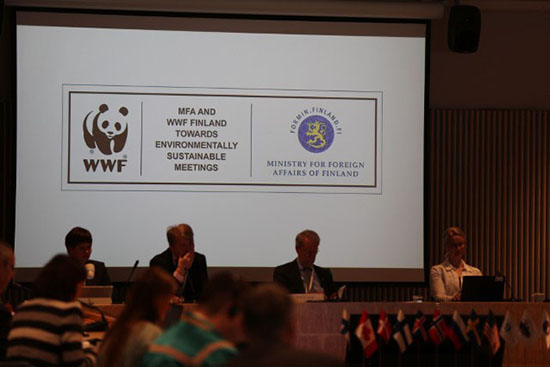Finland is setting a precedent to reduce the environmental impact of meetings. The Ministry for Foreign Affairs of Finland organises all the Arctic Council meetings in Finland during the Finnish chairmanship in an environmentally sustainable way.
The initiator and the heart behind the praiseworthy practise is conference coordinator Annariina Kukkonen.
“Two years ago my colleagues sat down to draft the chairmanship programme. In that meeting, I was the only one working with practical arrangements and I could not really contribute to the substance. However, I learned that when we talk about the Arctic, we always talk about environmental protection. I wanted us to contribute to that in a tangible way.”
As the pioneers, the chairmanship team had to make sure that they were approaching the theme correctly. The World Wildlife Fund is an observer in the Arctic Council, and their role as experts has been crucial for the project from the very beginning.
“I took my concept to WWF Finland and asked if they already had prepared guidelines for sustainable meetings. They had not, but they invited me for a talk and that is how our cooperation began”, Annariina Kukkonen explains.
Six months later, and after preparing the concept with WWF Finland, Annariina Kukkonen presented the idea at the Arctic Council Secretariat.
“The team welcomed the idea: we need to consider the environment when we organise conferences. They just wondered why no one had proposed it before.”
Annariina is enthusiastic about the initiative, but admits to having had some sleepless nights during conference preparations.
“At times I have been far outside my comfort zone, but this ended up becoming a great project. Everyone has received it positively.”
Organising a sustainable meeting is actually quite simple.
“It is a question of making environmentally-friendly choices in everything you plan or purchase, whether it is conference materials, meals or side programmes.”
Meeting organisers cannot necessarily do much about a hotel’s energy use or waste management or recycling policies. However, they can consider sustainability when sourcing materials or selecting service providers. If you are lucky enough to participate in one of the meetings organised by the Finnish Arctic Council chairmanship team, you will eat wonderful food with a good conscience.
“We want to know where the ingredients come from. We do our best to get local food, hopefully organic, and we follow the WWF recommendations when selecting food, fish or meat. We proudly place the WWF logo beside the Ministry for Foreign Affairs logo at the buffet table”, Annariina Kukkonen explains.
The Finnish team have got rid of many unnecessary materials. In the beginning, Annariina Kukkonen worried how the guests would react to the decision to limit the amount of paper in the meetings.
“All we put on the table are a pen and a notepad. We serve the drinks in pitchers, not in plastic bottles. We make an effort not to produce waste, so we do not use disposable cups and we avoid single-packed products.”
The meeting programmes are designed to minimise transportation. A nice walk to dinner will do a world of good after a long day sitting at the conference table. Whenever possible, the organisers want the guests to experience the Finnish nature.
“Of course we cannot always plan the programme in such a way that we can walk from one place to another. But short distances I always walk with the guests. If it happens to rain, we hand out ecological umbrellas.”
Annariina Kukkonen reminds that sustainable meetings are not expensive.
“We ask for organic, quality ingredients for our meals, and that may make the meals more expensive, but overall we have saved money, as we order in less stuff. This is a win-win concept. It is good for the environment, and it makes the controller happy.”
It is important to communicate the idea.
“We tell people that we seek sustainable solutions in our meetings. We talk about it in our social media. It may be that the conference participants would not even notice it otherwise”, Annariina Kukkonen says.
Annariina Kukkonen is proud of her achievement, especially as it seems that it will bear fruit for many years to come.
“The next Arctic Council chair, Iceland, have confirmed that they intend to continue the good environmental practices in the Arctic Council conferences. In the Ministry for Foreign Affairs, we are spreading the word among other ministries, departments and offices. I hope environmental sustainability will be the new normal in conference arrangements.”
The concept of environmentally sustainable meetings was presented at the first Arctic Council meeting in Helsinki.
Top of page: In Inari, organisers Annariina Kukkonen (left) and Virpi Voittonen transported materials by bike, not by car.
Photos (c) Ministry for Foreign Affairs of Finland.